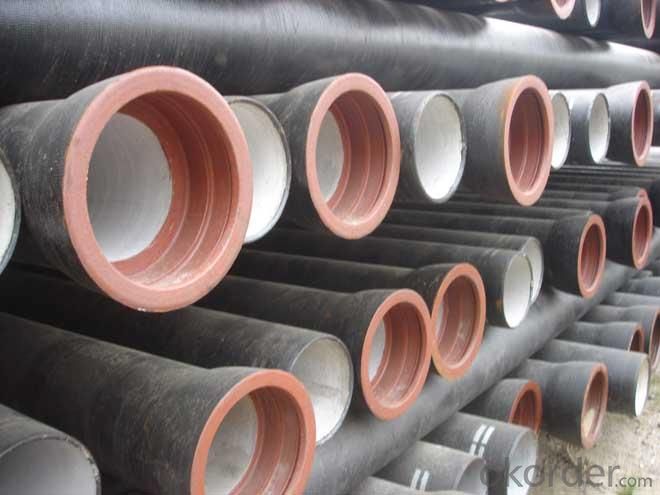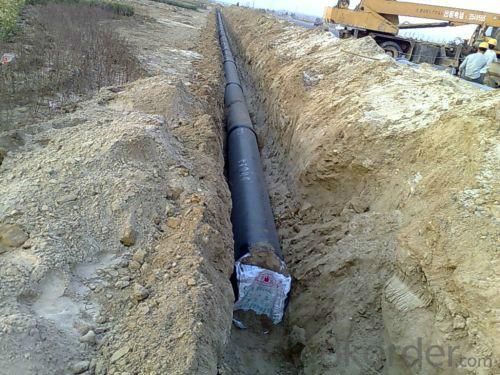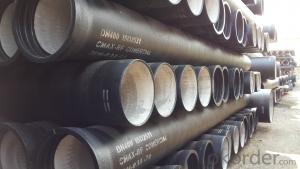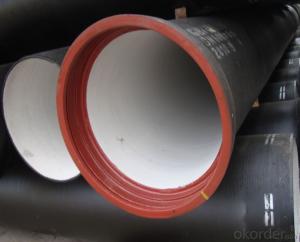Ductile Iron Pipe of China DN600 EN545 On Chip Price
- Loading Port:
- China main port
- Payment Terms:
- TT or LC
- Min Order Qty:
- 25 m.t.
- Supply Capability:
- 100000 m.t./month
OKorder Service Pledge
OKorder Financial Service
You Might Also Like
1,Ductile Iron Pipe Description :
1) Pipes confirm to ISO2531,K9 class,T type joint,6m long,with inside cements lining conform to ISO4179, outside Zinc spraying(130g/m2) and bitumen coating(70μm) conform to ISO8179.
2) Pipe ends: Spigot and socket ends, with 100% SBR rubber gaskets accoding to ISO4633
3) we can do third party inspection according to customer's request.
4) Our products have been sold to many international market,such as Middle East and South East Asia and Africa.
2,Main Features of the Ductile Iron Pipe:
·High yield strength
·High tensile Strength
·High corrosion resistance
·Pressure Resistence
·Anti-corrosion
·Installation is convenient
·Satisfy the highest hygienic standards
. Material: Ductile iron grade 500-7/ 450-10 in accordance with ISO1083
. Standard: ISO 2531, EN545, EN598, ANSI, AWWA
3,Ductile Iron Pipe Images:


4. Ductile Iron Pipe Specification
Surface Finishes:Bare, Oiled, Mill Varnish, Galv,FBE, FBE Dual, 3LPE, 3LPP, Coal Tar,Concrete Coating and Tape Wrap
End Finishes: Beveled, Square Cut, Threaded, hat
Additional Services: Internal Coating
Packaging: packed in bag, plastic bag, steel strip, steel wire,double wire, iron box, wooden box,
tarpaulin, plastic sheeting
Inspection: MOODY SGS BV GL DNV ABS LIOYD’S
Test :X-ray, UT, magnetic particle,inspection,hydrostatic test.
Processing service :Beveling, Threading, Slotting, Cut-to length, Bends, Quench and Temper, Fabrication, Double-jointing and On-site assistance
Documentary MTC: material certification,Origin certification, CI or PI,Test Report, export licence, handling order, B/L,insurance policy,shipping instructions, contract, packing list etc.
5.FAQ:
We have organized several common questions for our clients,may help you sincerely:
1.Q: Why would you choose ductile iron pipe rather than other pipe materials?
A:The reasons are obvious for that not only ductile iron pipe possesses the inherent strength and flexibility of ductile iron, combined with proven corrosion protection systems, but also the cost savings can be achieved from design to installation and commissioning.
2.Q:Why can you guarantee the inner of pipes can’t be corroded?
A: High alumina cement mortar lining and sulphate-resistant cement mortar lining. These two special linings are applicable to inner anti-corrosion for sewage pipes, improving resistance to erosion of the sewage components.
- Q:What is the average cost of ductile iron pipe?
- The average cost of ductile iron pipe can vary depending on several factors such as the diameter, length, and thickness of the pipe, as well as the supplier and location. On average, however, ductile iron pipe can range from approximately $40 to $200 per linear foot. It is important to note that these prices are estimates and can fluctuate based on market conditions and other variables. It is recommended to contact local suppliers or distributors for specific pricing information tailored to your project requirements.
- Q:Can ductile iron pipes be used in contaminated groundwater systems?
- Yes, ductile iron pipes can be used in contaminated groundwater systems. Ductile iron pipes are known for their corrosion resistance, making them suitable for handling water with various levels of contamination. Additionally, their strength and durability allow them to withstand the harsh conditions of contaminated groundwater systems.
- Q:What is the average diameter range of ductile iron pipes?
- The diameter of ductile iron pipes can vary depending on the application and industry standards. In general, there is a wide range of diameters available to meet different requirements. Ductile iron pipes can start from as small as 4 inches (100 mm) and go up to 64 inches (1600 mm) or even larger. These sizes are commonly used for water distribution, sewer systems, and infrastructure projects. It is important to consider factors such as local regulations, project specifications, and engineering considerations when determining the appropriate diameter range. Consult industry standards and relevant authorities for specific applications.
- Q:What are the common methods for cutting ductile iron pipes?
- There are several common methods for cutting ductile iron pipes, depending on the specific requirements and tools available. 1. Hand Saw: A hand saw with a carbide-tipped blade is commonly used for cutting smaller diameter ductile iron pipes. This method requires physical effort and may be time-consuming. 2. Reciprocating Saw: A reciprocating saw with a diamond or carbide abrasive blade is a more efficient option for cutting ductile iron pipes. This power tool allows for faster cutting and requires less physical effort. 3. Cut-Off Saw: A cut-off saw, also known as a chop saw or disc cutter, equipped with a diamond or abrasive blade is a popular method for cutting ductile iron pipes. This power tool provides precise and fast cuts, making it suitable for both small and large diameter pipes. 4. Band Saw: A band saw with a bi-metal or carbide-tipped blade is commonly used for cutting larger diameter ductile iron pipes. This method allows for clean and precise cuts, but it may require specialized equipment and expertise. 5. Grinding Wheel: In some cases, a grinding wheel with a diamond or abrasive disc can be used to cut ductile iron pipes. This method is suitable for smaller diameter pipes or when other cutting tools are not available. It is important to note that regardless of the method used, proper safety precautions should always be followed, including wearing appropriate protective gear and using clamps or vices to secure the pipe during cutting. Additionally, it is recommended to consult with professionals or manufacturers' guidelines for specific recommendations on cutting ductile iron pipes.
- Q:What are the typical maintenance requirements for ductile iron pipe?
- To maintain ductile iron pipe, it is necessary to conduct regular inspections, clean the pipe, and repair any damage. Inspections play a crucial role in identifying signs of damage, corrosion, or leaks. This can be done visually or using non-destructive testing techniques such as ultrasonic or magnetic particle testing. Regular inspections are important for detecting and addressing issues before they worsen and cause significant damage. Cleaning is another essential maintenance requirement for ductile iron pipe. Over time, sediment, scale, and debris can accumulate inside the pipe, reducing its flow capacity and potentially causing blockages. Regular cleaning methods like high-pressure water jetting or mechanical cleaning can remove these deposits, ensuring optimal flow and preventing problems related to reduced flow or pressure. Repairing any damage or corrosion is crucial for maintaining ductile iron pipe. If cracks, leaks, or other forms of damage are detected during inspections, prompt repairs are necessary to prevent further deterioration and potential failure. Depending on the extent of the damage, repairs may include welding, epoxy lining, or replacement of the affected section of the pipe. In addition to these specific maintenance requirements, implementing a comprehensive maintenance program is important. This may involve preventative measures such as cathodic protection to prevent corrosion or the application of protective coatings to extend the pipe's lifespan. Overall, regular inspections, cleaning, and repairs are necessary for maintaining ductile iron pipe. Following these maintenance practices ensures the pipe's longevity, reliability, and optimal performance, reducing the risk of failures and disruptions.
- Q:Can ductile iron pipes be used for underground sewage systems?
- Yes, ductile iron pipes can be used for underground sewage systems. Ductile iron is a type of cast iron that has enhanced flexibility and strength, making it suitable for various applications, including sewage systems. Ductile iron pipes offer several advantages for underground sewage systems. Firstly, they have excellent corrosion resistance, which is crucial in sewage systems where the presence of moisture and chemicals can cause corrosion over time. This resistance to corrosion ensures the long-term durability and reliability of the pipes. Secondly, ductile iron pipes have high tensile strength, allowing them to withstand the pressure and stress that can occur in underground sewage systems. They are resistant to ground movements, such as soil settling or shifting, which can cause damage to other types of pipes. Furthermore, ductile iron pipes have a smooth internal surface, which results in a better flow capacity and reduces the likelihood of clogging or blockages in the sewage system. This smooth surface also helps to minimize the accumulation of debris and sediment, reducing the need for frequent maintenance and cleaning. Another important factor is that ductile iron pipes are available in various sizes and can easily be connected using a range of joint systems, allowing for flexibility in designing and constructing underground sewage systems. In summary, ductile iron pipes are an excellent choice for underground sewage systems due to their corrosion resistance, high tensile strength, smooth internal surface, and ease of installation.
- Q:How can the old water pipe ductile iron pipe be opened with three flanges?
- First, the new process adopted; groove connection. With groove pieces, of course, ductile iron pipes should also be grooved pipes.Two, the old process1. dozen to lead lead; cut into strips, with a file play in the interface2. use expanded cement with asbestos3 use the asphaltBecause the interface material used in the old process is poisonous, especially in the water supply pipeline, environmental protection requires a new process now.
- Q:Why does the cast iron pipe always run off when testing?
- The pipeline is installed, straight section of each pipe will be added pier, concrete pipe, elbow, three links should also have concrete pier, specific installation method according to GB Atlas 03SS515, and the straight pipe to soil, pipeline interface will be exposed, easy to check.
- Q:Are ductile iron pipes suitable for oil and gas pipeline applications?
- Indeed, oil and gas pipeline applications can benefit greatly from the suitability of ductile iron pipes. With a multitude of properties that make them ideal for such uses, ductile iron pipes are a wise choice. First and foremost, the high tensile strength possessed by ductile iron pipes enables them to effectively handle the immense pressure and stress associated with oil and gas transmission. This ensures their ability to withstand the rigorous conditions and maintain their structural integrity over time. Additionally, ductile iron pipes exhibit exceptional resistance to corrosion. Given that oil and gas pipelines are exposed to various corrosive elements, such as water, chemicals, and salts, ductile iron pipes are equipped with a protective lining, typically composed of cement mortar or polyethylene. This lining effectively combats corrosion and prolongs the lifespan of the pipes. Moreover, ductile iron pipes boast impressive durability and longevity. With a service life typically spanning from 50 to 100 years, depending on specific conditions and maintenance practices, they prove to be a reliable choice for oil and gas pipeline applications. Consequently, the need for frequent replacements is reduced, resulting in minimized downtime. Furthermore, the flexibility inherent in ductile iron pipes allows them to endure ground movement and absorb shocks and vibrations. This flexibility is especially crucial in oil and gas pipeline applications, where the pipes must adapt to ever-changing terrain and environmental conditions. Lastly, ductile iron pipes offer a cost-effective alternative to other commonly used materials in oil and gas pipelines, such as steel. Striking a favorable balance between performance and price, they emerge as a practical choice for pipeline projects of varying scales. In summary, the combination of high tensile strength, corrosion resistance, durability, flexibility, and cost-effectiveness renders ductile iron pipes highly suitable for oil and gas pipeline applications.
- Q:Can ductile iron pipes be used for irrigation systems in saline soil conditions?
- Yes, ductile iron pipes can be used for irrigation systems in saline soil conditions. Ductile iron pipes are known for their durability and corrosion resistance, making them suitable for various soil conditions, including saline soil. Saline soil contains high levels of salt, which can cause corrosion and deterioration of certain materials. However, ductile iron pipes have a protective coating, such as cement mortar lining or polyethylene encasement, which provides an additional layer of protection against corrosion. This ensures that the pipes can withstand the corrosive effects of saline soil and maintain their structural integrity over a long period of time. Additionally, ductile iron pipes have a high tensile strength, making them resistant to cracks and breaks, which is important for irrigation systems that require a continuous and reliable water supply. Therefore, ductile iron pipes are a suitable choice for irrigation systems in saline soil conditions.
1. Manufacturer Overview |
|
|---|---|
| Location | |
| Year Established | |
| Annual Output Value | |
| Main Markets | |
| Company Certifications | |
2. Manufacturer Certificates |
|
|---|---|
| a) Certification Name | |
| Range | |
| Reference | |
| Validity Period | |
3. Manufacturer Capability |
|
|---|---|
| a)Trade Capacity | |
| Nearest Port | |
| Export Percentage | |
| No.of Employees in Trade Department | |
| Language Spoken: | |
| b)Factory Information | |
| Factory Size: | |
| No. of Production Lines | |
| Contract Manufacturing | |
| Product Price Range | |
Send your message to us
Ductile Iron Pipe of China DN600 EN545 On Chip Price
- Loading Port:
- China main port
- Payment Terms:
- TT or LC
- Min Order Qty:
- 25 m.t.
- Supply Capability:
- 100000 m.t./month
OKorder Service Pledge
OKorder Financial Service
Similar products
New products
Hot products
Hot Searches
Related keywords


























